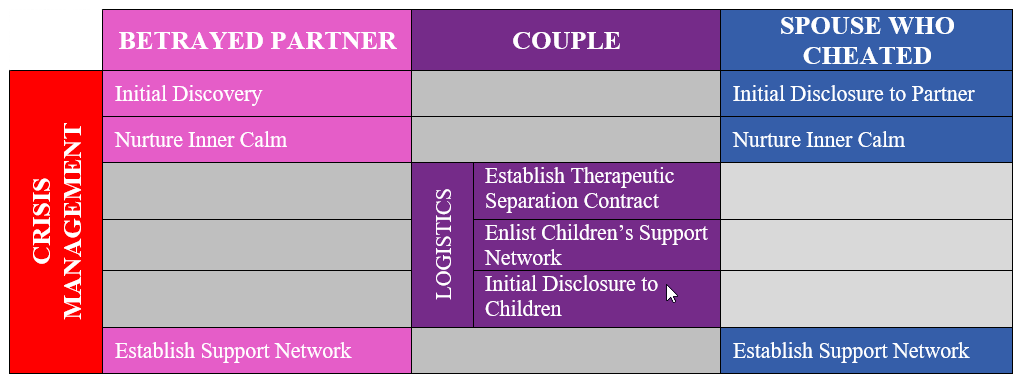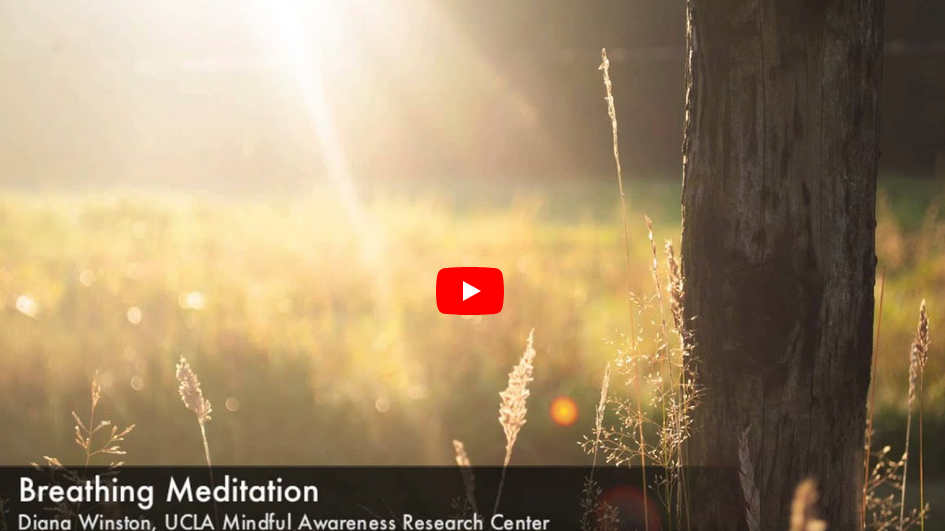These mindfulness strategies will not erase the pain or solve any of the problems. The distraction from the intensity of the response to the infidelity can, however, help both the betrayed partner and the spouse who committed the infidelity regroup and focus. With a semblance of calm restored, they can join together as a couple and create a plan for getting through the difficult next days and weeks.
Couple Task: Dealing With Logistics
Especially if there are children involved, it is essential for the couple to come together on a plan for just making it through the crisis of infidelity being revealed. The couple faces three essential tasks that need to be addressed immediately and collaboratively:
- Agree on the logistics of the temporary separation
- Disclose essential information to the children
- Enlist a small, safe support network for the children
COUPLE TASK 1: LOGISTICS
The logistics of taking time apart can be complicated. There are issues that require immediate decisions.
- Where will each person live during the time apart?
- How will childcare and access be managed?
- How will finances be handled?
- Who will use which vehicle?
- What do we tell the children? Friends? Family members? Colleagues?
It is often wise to focus on these logistical issues and put the enormous tasks of dealing with the infidelity itself on temporary hold.
Appendix B of the book REBUILDING: When Your Relationship Ends by Bruce Fisher EdD, Robert Alberti has a guide to a healing or therapeutic separation which can be a useful guide to dealing with the immediate logistical issues following disclosure or discovery of infidelity.
COUPLE TASK 2: INITIAL DISCLOSURE TO CHILDREN
Rudoph Dreikurs once said that children are great observers and rotten interpreters. In the absence of an honest reason why their parents are taking a time apart, children will manufacture a reason. Because of their egocentric stage of development, children often create a narrative that puts themselves in the centre of everything. “Daddy had to leave because I was so noisy!”
While children need honesty, it is important not to over-disclose and to give the children the assurance that both parents love them and will continue to be there for them. M. Deborah Corley & Jennifer P. have written extensively on the disclosure process.
One couple put it something like this way when they met with their children.
Father: Mommy and Daddy are going to live in different houses for a while.
Mother: I made a mistake and I had a boyfriend. That really hurt Daddy.
Father: We need to take some time to figure things out.
Mother: I am going to move into grandma and grandpa’s house for a while.
Father: You will stay here with me and go to the same school.
Mother: We both really love you and you will get lots of time with both of us.
Father: We know this isn’t what you want, but it is best for now.
Mother: What would you like to ask us or say to us?
While is it only realistic that parents show some emotion, it is also important to demonstrate that the parents continue to be the strong adults the children can rely on. It is destructive to place children in a position where they feel the need to become the caregiver for their parents.
COUPLE TASK 3: ENLIST SUPPORT FOR THE CHILDREN
Agreeing on the mature, compassionate, nonjudgmental adults to ask to support the children in the aftermath is a task for the couple to work through together. Grandparents, aunts, uncles, and close family friends are often the most logical support network for children. The children can’t take sides. It is vital that, despite what they may think and feel, none of these supporting adults say anything against either parent. At the same time, it is important that the children have a safe space where they can express what they are experiencing. It is a demanding task for those trusted with being the children’s support network.
Healing a Child's Heart After Divorce: 100 Practical Ideas for Families, Friends and Caregivers by Alan Wolfelt and Raelynn Maloney offers clear guidelines to the children’s support network.
With the logistics and the immediate needs of the children taken care of, the attention turns to the individual recovery of the betrayed partner and the spouse who committed the infidelity.






